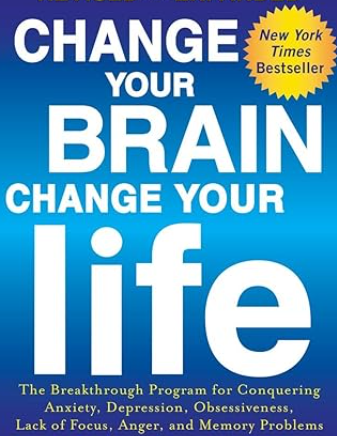Change Your Brain, Change Your Life: The Science of Brain Health And Mental Strength
The Rich Roll Podcast with Dr. Daniel Amen | June 9, 2025
In a world where mental health issues are on the rise, Dr. Daniel Amen, a renowned psychiatrist, brain health expert, and 12-time New York Times bestselling author, offers a revolutionary message: You are not stuck with the brain you have. You can make it better.
In this blog post, we’ll explore Dr. Amen’s insights on brain health, debunk common myths, and provide practical tips to optimize your brain for longevity, focus, and mental strength. Whether you’re dealing with ADHD, dementia, or simply want to improve your cognitive function, this guide will help you take control of your brain health.
The Brain Health Revolution
Dr. Amen’s mission is to end mental illness by creating a revolution in brain health. He emphasizes that psychiatrists are the only medical doctors who rarely look at the organ they treat—the brain. This oversight has led to a lack of understanding about how to truly improve mental health.
Key Takeaway: Your brain is the most important organ in your body. If it’s not functioning well, nothing else will.
The 11 Risk Factors That Steal Your Mind
Dr. Amen identifies 11 major risk factors that can harm your brain, which he summarizes with the acronym BRIGHT MINDS:
BRIGHT MINDS: The 11 Risk Factors That Steal Your Mind — And How to Fight Back
Letter | Risk Factor | What It Means | Example | How to Mitigate the Risk |
B | Blood Flow | Reduced blood flow = lower brain function | Sedentary lifestyle, smoking | Exercise regularly (e.g., walking), quit smoking, manage blood pressure |
R | Retirement/Aging | Aging without mental activity speeds decline | Not learning new skills after retirement | Stay mentally active: read, take classes, socialize |
I | Inflammation | Chronic inflammation harms neurons | Poor diet, autoimmune conditions | Eat anti-inflammatory foods (omega-3s, greens), reduce sugar |
G | Genetics | Family history may increase risk | Alzheimer’s, depression in family | Lifestyle choices (diet, exercise, brain stimulation) can offset risks |
H | Head Trauma | Injuries impact brain structure | Concussions, car accidents | Wear helmets, avoid risky sports, fall-proof your home |
T | Toxins | Environmental/chemical exposure damages brain | Mold, drugs, alcohol, pollutants | Use natural products, avoid alcohol and recreational drugs |
M | Mental Health | Disorders affect brain chemistry | Depression, anxiety | Therapy, medication (if needed), mindfulness, brain scans |
I | Immunity/Infections | Infections can disrupt brain function | Lyme disease, long COVID | Treat infections early, support immune system with rest and nutrition |
N | Neurohormones | Hormonal imbalances affect mood and memory | Low thyroid, testosterone imbalance | Get hormone levels tested; use lifestyle or medical treatments |
D | Diabesity | Diabetes + Obesity = inflammation + insulin resistance | High sugar diet, weight gain | Eat low-glycemic diet, exercise, monitor blood sugar |
S | Sleep | Poor sleep reduces brain repair and function | Insomnia, sleep apnea | Maintain sleep routine, avoid screens at night, get evaluated for apnea |
Key Takeaway: To protect your brain, you need to address these 11 risk factors. Genetics may load the gun, but lifestyle pulls the trigger.
The Power of Neuroplasticity
One of the most exciting discoveries in neuroscience is neuroplasticity—the brain’s ability to change and adapt. Dr. Amen’s work with brain imaging (SPECT scans) has shown that you can improve your brain’s function through targeted interventions.
Practical Tip: Engage in activities that promote neuroplasticity, such as learning new skills, exercising, and practicing mindfulness.
ADHD: More Than Just Hyperactivity
Dr. Amen has identified 7 types of ADHD, each with unique characteristics. Contrary to popular belief, ADHD isn’t just about hyperactivity. It can manifest as inattention, impulsivity, or even over-focus.
Key Takeaway: ADHD is a brain-based condition that can be managed with the right strategies, including exercise, supplements, and sometimes medication.
The Link Between Brain Health and Mental Health
Mental health issues like depression and anxiety are often rooted in brain dysfunction. Dr. Amen emphasizes that treating the brain is key to resolving these conditions.
Practical Tip: If you’re struggling with mental health, consider getting a brain scan to identify underlying issues. Treatments like therapy, lifestyle changes, and targeted supplements can make a significant difference.
Raising Mentally Strong Kids
In his book Raising Mentally Strong Kids, Dr. Amen highlights the importance of parenting strategies in fostering mental resilience. He advocates for firm but loving parenting and emphasizes the need to let kids solve their own problems.
Key Takeaway: Don’t rescue your kids from every challenge. Let them learn and grow by solving problems on their own.
The Role of Technology in Mental Health
Social media and devices are taking a toll on mental health, especially among teenagers. Dr. Amen warns that these technologies are designed to be addictive and can wear out the brain’s pleasure centers.
Practical Tip: Limit screen time, especially before bed. Encourage kids to engage in activities that promote brain health, like reading, sports, and creative play.
Practical Tips for Brain Health
Here are some actionable steps you can take to improve your brain health:
- Exercise Regularly: Physical activity increases blood flow to the brain and promotes neuroplasticity.
- Eat a Brain-Healthy Diet: Focus on foods rich in omega-3 fatty acids, antioxidants, and healthy fats.
- Prioritize Sleep: Aim for 7-9 hours of quality sleep each night.
- Manage Stress: Practice mindfulness, meditation, or yoga to reduce stress and improve mental clarity.
- Stay Socially Connected: Strong social connections are linked to better brain health and longevity.
Key Takeaway: Small, consistent changes in your lifestyle can have a big impact on your brain health.
The Importance of Brain Envy
Dr. Amen coined the term “brain envy” to describe the desire to have a healthy, high-functioning brain. He believes that loving your brain is the first step to improving it.
Practical Tip: Ask yourself daily, “Is this good for my brain or bad for it?” This simple question can guide you toward healthier choices.
The Impact of Childhood Trauma on Brain Health
Dr. Amen emphasizes that childhood trauma can have long-lasting effects on brain health. Adverse Childhood Experiences (ACEs) can increase the risk of mental health issues, addiction, and even early death.
Key Takeaway: Addressing past trauma through therapy and self-care is crucial for long-term brain health.
The Role of Nutrition in Brain Health
What you eat directly impacts your brain. Dr. Amen recommends a diet rich in whole foods, healthy fats, and lean proteins to support brain function. He also highlights the importance of omega-3 fatty acids for reducing inflammation and improving cognitive performance.
Practical Tip: Incorporate foods like salmon, walnuts, and blueberries into your diet to boost brain health.
The Dangers of Toxins
Environmental toxins, including those found in personal care products and cleaning supplies, can harm your brain. Dr. Amen advises using non-toxic, natural products to reduce your exposure to harmful chemicals.
Practical Tip: Use apps like Think Dirty or EWG’s Healthy Living to scan products and ensure they’re safe for your brain and body.
The Connection Between Sleep and Brain Health
Sleep is essential for brain health. Poor sleep can lead to cognitive decline, mood disorders, and even Alzheimer’s disease. Dr. Amen recommends establishing a consistent sleep routine and creating a sleep-friendly environment.
Practical Tip: Avoid screens before bed, keep your bedroom cool and dark, and aim for 7-9 hours of sleep each night.
The Role of Hormones in Brain Health
Hormonal imbalances can affect brain function. Dr. Amen suggests getting your hormones checked regularly and addressing any imbalances through lifestyle changes or medical interventions.
Practical Tip: If you’re experiencing symptoms like fatigue, mood swings, or brain fog, consider getting your hormone levels tested.
The Power of Gratitude and Positive Thinking
Dr. Amen emphasizes the importance of cultivating a positive mindset for brain health. Practicing gratitude and focusing on what’s going well in your life can improve mental well-being and reduce stress.
Practical Tip: At the end of each day, write down three things you’re grateful for. This simple practice can boost your mood and improve your brain health.
The Role of Exercise in Brain Health
Exercise isn’t just good for your body—it’s essential for your brain. Dr. Amen highlights that regular physical activity increases blood flow to the brain, reduces inflammation, and promotes the growth of new brain cells.
Practical Tip: Incorporate a mix of aerobic exercise, strength training, and coordination activities like table tennis or pickleball to keep your brain sharp.
The Importance of Mental Stimulation
Keeping your brain active is crucial for maintaining cognitive function as you age. Dr. Amen recommends engaging in mentally stimulating activities like puzzles, reading, and learning new skills.
Practical Tip: Challenge your brain by learning a new language, playing a musical instrument, or taking up a new hobby.
The Role of Social Connections in Brain Health
Strong social connections are linked to better brain health and longevity. Dr. Amen emphasizes that loneliness and social isolation can have a negative impact on your brain.
Practical Tip: Make an effort to stay connected with friends and family, join social groups, or volunteer in your community.
The Impact of Stress on Brain Health
Chronic stress can wreak havoc on your brain, leading to cognitive decline and mental health issues. Dr. Amen recommends practicing stress management techniques like meditation, deep breathing, and yoga.
Practical Tip: Set aside time each day to relax and unwind. Even just 10 minutes of deep breathing can make a big difference.
The Role of Supplements in Brain Health
While a healthy diet is the foundation of brain health, Dr. Amen also recommends certain supplements to support cognitive function. These include omega-3 fatty acids, vitamin D, and antioxidants like vitamin E and C.
Practical Tip: Consult with a healthcare professional before starting any supplement regimen to ensure it’s right for you.
The Importance of Regular Check-Ups
Regular health check-ups are crucial for maintaining brain health. Dr. Amen suggests getting your blood pressure, cholesterol, and blood sugar levels checked regularly to prevent conditions that can harm your brain.
Practical Tip: Schedule annual check-ups with your healthcare provider to monitor your overall health and catch any potential issues early.
Final Thoughts: You Can Change Your Brain
Dr. Amen’s work is a powerful reminder that your brain is not fixed. You have the power to change it for the better. Whether you’re dealing with mental health issues, cognitive decline, or simply want to optimize your brain function, the strategies outlined in this post can help you take control of your brain health.
Key Takeaway: Your brain is your most valuable asset. Treat it with care, and it will reward you with a lifetime of mental strength and clarity. About Dr. Daniel Amen
By incorporating these practical tips and insights into your daily routine, you can harness the power of neuroplasticity and take control of your brain health. Remember, it’s never too late to start—your brain is waiting for you to make it better.

Change Your Brain Change Your Life
Dr. Daniel Amen is a psychiatrist, brain health expert, and the founder of Amen Clinics. You can dive deeper into this topic in his book Change Your Brain, Change Your Life.
Related Post





